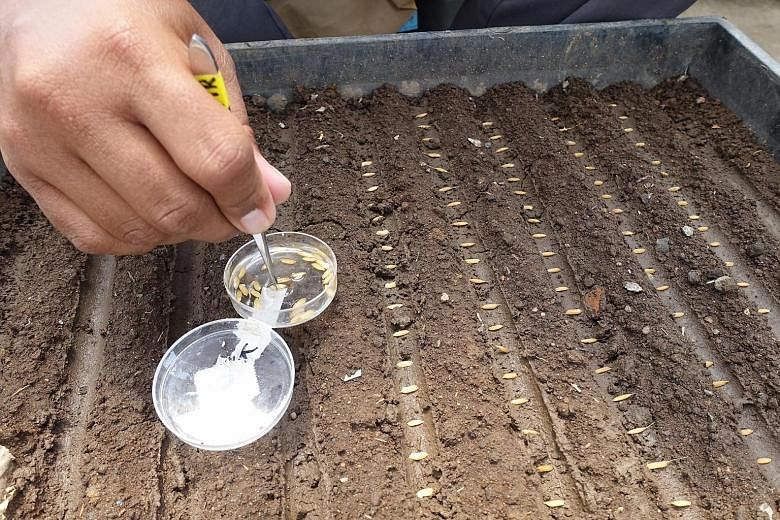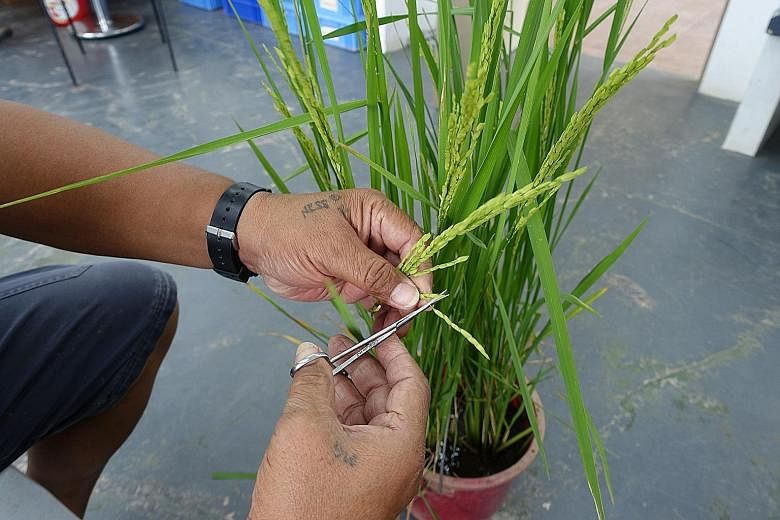Stray animals are not welcome inside the lush fields here, and neither are random strangers. At the International Rice Research Institute (Irri), headquartered in Laguna province in the Philippines, ongoing experiments on rice varieties and traits take place behind tight fences under the close watch of security guards.
The 58-year-old, non-profit research institute, which has offices in 17 rice-growing countries in Asia and Africa, was at the forefront of the "Green Revolution" from the late 1960s, when it boosted rice production in the region by developing high-yielding rice.
Working with local partners, Irri has developed rice varieties that are tolerant to flash floods, saline water, as well as drought.
One of its more successful Indica varieties - grown in warmer climates - called the "IR64", for example, matured early, was resistant to diseases and tasted good.
But these days, as increasingly erratic weather can scorch farms, submerge crops and scour the earth of nutrients within short periods of time, the challenge is to produce rice that can withstand all types of environmental stresses and yet maintain high yields, says Irri researcher Shalabh Dixit.
"In a flood-prone season, you might get drought, and the crop might still fail," he told The Sunday Times during a tour of Irri's experiment stations.
With global warming, "temperature stress is one thing that people are starting to worry about a bit more", he said.
As rice is particularly sensitive to heat when flowering, scientists at Irri are looking at what can make rice flower earlier in the morning - and not be as susceptible to the higher midday temperatures.
To help farmers in low-lying areas near rivers, where floodwaters don't drain as fast, scientists are also trying to identify the gene that will make rice plants more resilient to long-term or "stagnant" flooding.
According to the Food and Agriculture Organisation's Rice Market Monitor, overall prices of rice dropped 12.3 per cent between 2014 and last year. But urbanisation and industrialisation are shrinking the pool of people willing to plant rice.
This labour shortage has made the development of direct-seeded rice more urgent, says Dr Dixit.
Under this method, rice seeds are sown directly onto the field, reducing the effort needed to sprout rice in a nursery and transplant seedlings into standing water, as is traditionally done.
Breeding stress-resistant types of rice is only half the story. Convincing farmers to use them is another hurdle.
"Farmer uptake of agro-technology is quite a complicated process," says Dr Jon Hellin, Irri's platform leader for sustainable impact. Certain groups of farmers, like those who can profit from farming, need to be targeted for maximum impact. "If we want to feed the world, we need to work with farmers for whom farming is a way out of poverty," he told The Sunday Times.
Widening the cultivation of new rice varieties also requires institutions and governments to address questions like whether grain storage, rice-milling and transport facilities are adequate, and whether farmers can get their hands on the machinery needed to make the best of these new varieties.
Farmers may also be reluctant to try new rice varieties if they are uncertain of how these may perform - something that insurance can help mitigate, he said.
"A lot of people think we just have to increase production. It's so much more than that," he said.


